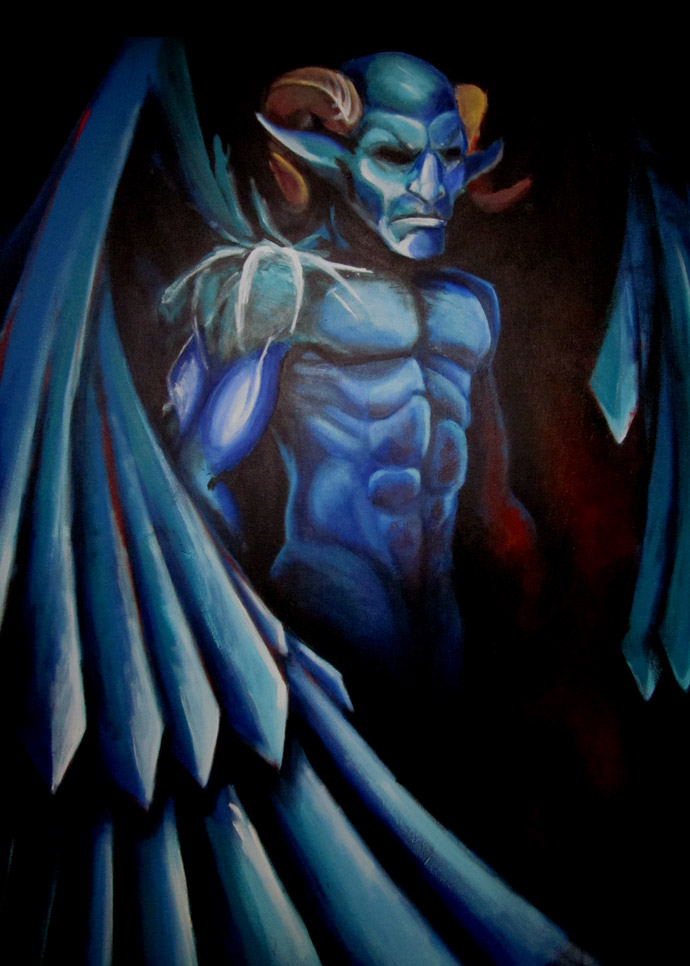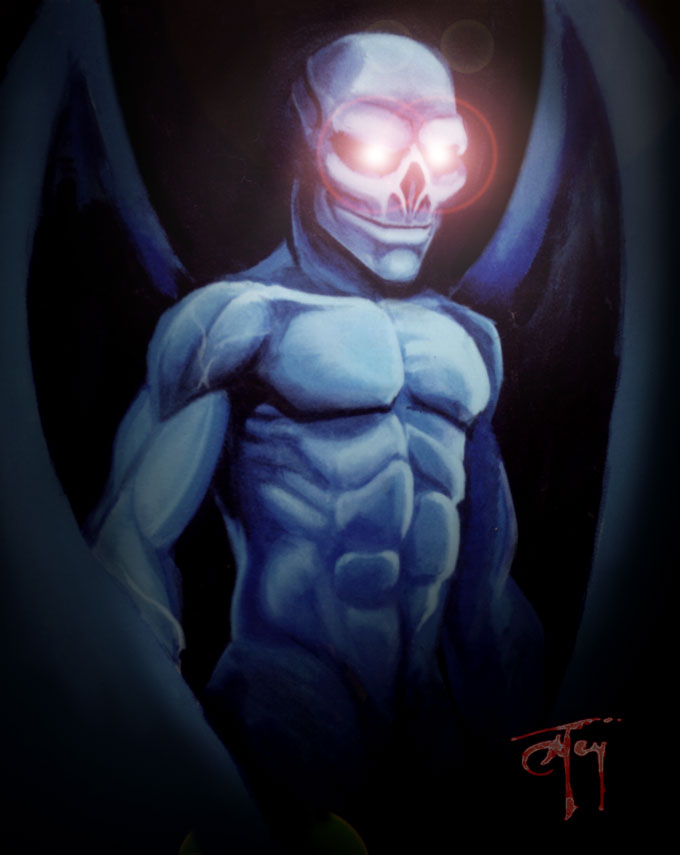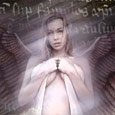Client
: Personal Folio Piece.
Acrylic Painting
: ( on
Canvas ) 1999.
2 versions, unfinished ( more a work in progress )
Photographed, Scanned,
effects added in Adobe Photoshop 2003 a.d
Design
Notes:
Edward William Lane (British
Orientalist, translator and lexicographer):His notes regarding jinni
The frequent mention of Genii (from
Arabic جني jinnie) in this
work, and the erroneous accounts that have been given of these fabulous
beings by various European writers, have induced me to examine the
statements respecting them in several Arabic works; and I shall here
offer the result of my investigation, with a previous account of the
Angels.
The Muslims, in general, believe in three different species of created
intelligent beings; namely, Angels, who are created of light; Genii,
who are created of fire; and Men, created of earth. The first species
are called “Meláïkeh” (sing. “Melek”);
the second, “Jinn” or “Ginn” (sing. “Jinnee” or “Ginnee”);
the third, “Ins” (sing. “Insee”). Some hold
that the Devils (Sheytáns) are of a species distinct from
Angels and Jinn; but the more prevailing opinion, and that which
rests on the highest authority, is that they are rebellious Jinn.
“It is believed,” says El-Kazweenee, “that the Angels are
of a simple substance, endowed with life, and speech, and reason; and that
the difference between them and the Jinn and Sheytáns is a difference
of species. Know,” he adds, “that the Angels are sanctified from
carnal desire and the disturbance of anger: they disobey not God in celebrating
of his glory; their drink, the proclaiming of his holiness; their conversation,
the commemoration of God, whose name be exalted; their pleasure, his worship:
they are created in different forms, and with different powers.” Some
are described as having the forms of brutes. Four of them are Archangels; Jebraeel or Jibreel ( Gabriel), the angel of revelations; Meekaeel or Meekál ( Michael), the patron of the Israelites; ’Azraeel, the angel of death;
and Isráfeel, the angel of the trumpet, which he is to sound twice,
or some say thrice, at the end of the world: one blast will kill all living
creatures (himself included): another, forty years after, (he being raised
again for this purpose, with Jebraeel and Meekaeel,) will raise the dead. These
Archangels are also called Apostolic Angels. They are inferior in dignity to
human prophets and apostles, though superior to the rest of the human race:
the angelic nature is held to be inferior to the human nature, because all
the Angels were commanded to prostrate themselves before Adam. Every believer
is attended by two guardian and recording angels; one of whom writes his good
actions, the other, his evil actions: or, according to some, the number of
these angels is five, or sixty, or a hundred and sixty. There are also two
Angels, called Munkar (vulg. Nákir) and Nekeer, who examine all the
dead, and torture the wicked in their graves.
The species of Jinn is said to have been created some thousands of
years before Adam. According to a tradition from the Prophet, this
species consists of five orders or classes; namely, Jánn (who
are the least powerful of all), Jinn, Sheytáns ( Devils), ’Efreets,
and Márids. The last, it is added, are the most powerful;
and the Jánn are transformed Jinn; like as certain apes and
swine were transformed men (Kur-án 5:65). It must however,
be remarked here, that the terms Jinn and Jánn are generally
used indiscriminately, as names of the whole species (including the
other orders above mentioned) whether good or bad; and that the former
term is the more common. Also, that “Sheytán” is
commonly used to signify any evil Jinnee. An ‘Efreet is a powerful evil Jinnee: a Márid, an evil Jinnee of the most powerful
class. The Jinn (but generally speaking, evil ones) are called by
the Persians “Deevs;” the most powerful evil, “Narahs” (which
signifies “males,” though they are said to be males and
females); the good Jinn, “Perees;” though this term more
commonly applies to females.
In a tradition from the Prophet, it is said, “The Jánn were created of a smokeless fire.” The word which signifies “a
smokeless fire” has been misunderstood by some as meaning “the
flame of fire:” El-Jóharee (in the Seháh) renders
it rightly; and says that of this fire was the Sheytán (Iblees)
created. “El-Jánn” is sometimes used as a name
for Iblees; as in the following verse of the Kur-án:- “And
the Jánn [the father of the Jinn, i.e. Iblees] we had created
before [i.e. before the creation of Adam] of the fire of the samoom
[i.e. of the fire without smoke].” “Jánn” also
signifies “a serpent;” as in other passages of the Kur-án;
and is used in the same book as synonymous with “Jinn.” In
the last sense it is generally believed to be used in the tradition
quoted in the commencement of this paragraph. There are several apparently
contradictory traditions from the Prophet which are reconciled by
what has been above stated: in one, it is said, that Iblees was the
father of all the Jánn and Sheytáns; Jánn being
here synonymous with Jinn: in another, that Jánn was the father
of all the Jinn; here, Jánn being used as the name of Iblees.
“It is held,” says El-Kazweenee, “that the Jinn are aerial
animals, with transparent bodies, which can assume various forms. People differ
in opinion respecting these beings: some consider the Jinn and Sheytáns as unruly men; but these persons are of the Moatezileh [a sect of Muslim freethinkers]:
and some hold, that God, whose name be exalted, created the Angels of the light
of fire, and the Jinn of its flame [but this is at variance with the general
opinion] and the Sheytáns of its smoke [which is also at variance with
the common opinion]; and that [all] these kinds of beings are [usually] invisible
to men, but that they assume what forms they please, and when their form becomes
condensed they are visible.” - This last remark illustrates several descriptions
of Jinnees in this work; where the form of the monster is at first undefined,
or like an enormous pillar, and then gradually assumes a human shape and less
gigantic size. The particular forms of brutes , reptiles, &c., in which
the Jinn most frequently appear will be mentioned hereafter.
It is said that God created the Jánn [or Jinn] two thousand
years before Adam [or, according to some writers, much earlier];
and that there are believers and infidels and every sect among them,
as among men. Some say that a prophet, named Yoosuf, was sent to
the Jinn: others, that they had only preachers, or admonishers: others,
again, that seventy apostles were sent, before Mohammed, to Jinn and men conjointly. It is commonly believed that preadamite Jinn were governed by forty (or, according to some, seventy-two) kings,
to each of which the Arab writers give the name of Suleymán (or Solomon); and that they derive their appellation from the last
of these, who was called Jánn Ibn-Jánn, and who, some
say, built the pyramids of Egypt. The following account of the preadamite
Jinn is given by Al-Kazweenee.- “It is related in histories,
that a race of Jinn, in ancient times, before the creation of Adam,
inhabited the earth and covered it, the land and the sea, and the
plains and the mountains; and the favours of God were multiplied
upon them, and they had government, and prophecy, and religion, and
law; but they transgressed and offended, and opposed their prophets,
and made wickedness to abound in the earth; whereupon, God, whose
name be exalted, sent against them an army of Angels, who took possession
of the earth, and drove away the Jinn to the regions of the islands,
and made many of them prisoners; and of those who were made prisoners
was ’Azázeel [afterwards called Iblees, from his despair];
and a slaughter was made among them. At that time, ’Azázeel was young: he grew up among the Angels [and probably for that reason
was called one of them], and became learned in their knowledge, and
assumed the government of them; and his days were prolonged until
he became their chief; and thus it continued for a long time, until
the affair between him and Adam happened, as God, whose name be exalted,
hath said, ‘When we said unto the Angels, Worship ye Adam,
and [all] worshipped except Iblees, [who] was [one] of the Jinn.’”
“Iblees,” we are told by another authority, “was sent as
a governor upon the earth, and judged among the Jinn a thousand years, after
which he ascended into heaven, and remained employed in worship until the creation
of Adam.” The name of Iblees was originally, according to some, ’Azázeel
(as before mentioned; and according to others, El-Hárith: his patronymic
is Aboo-Murrah, or Abu-l-Ghimr. It is disputed whether he was of the Angels
or of the Jinn. There are three opinions on this point. - 1. That he was of
the Angels, from a tradition from Ibn-‘Abbás. - 2. That he was
of the Sheytáns (or evil Jinn); as it is said in the Ku-rán, “except
Iblees, [who] was [one] of the Jinn:” this was the opinion of El-Hasan
El-Basree, and is that commonly held. - 3. That he was neither of the Angels
nor of the Jinn; but created alone, of fire. - Ibn-‘Abbás founds
his opinion on the same text from which El-Hasan El-Basree derives his: “When
we said unto the Angels, Worship ye Adam, and [all] worshipped except Iblees,
[who] was [one] of the Jinn” (before quoted: which he explains by saying,
that the most noble and honourable among the Angels are called “the Jinn,” because
they are veiled from the eyes of the other Angels on account of their superiority;
and that Iblees was one of these Jinn. He adds, that he had the government
of the lowest heaven and of the earth, and was called the Táoos (literally,
Peacock) of the Angels; and that there was not a spot in the lowest heaven
but he had prostrated himself upon it: but when the Jinn rebelled upon the
earth, God sent a troop of Angels who drove them to the islands and mountains;
and Iblees being elated with pride, and refusing to prostrate himself before
Adam, God transformed him into a Sheytán. - But this reasoning is opposed
by other verses, in which Iblees is represented as saying, “Thou has
created me of fire, and hast created him [Adam] of earth.” It is therefore
argued, “If he were created originally of fire, how was he created of
light? For the Angels were [all] created of light.” - The former verse
may be explained by the tradition, that Iblees, having been taken captive,
was exalted among the Angels; or perhaps there is an ellipsis after the word “Angels;” for
it might be inferred that the command given to the Angels was also (and à fortiori)
to be obeyed by the Jinn.
According to a tradition, Iblees and all the Sheytáns are
distinguished from the other Jinn by a longer existence. “The
Sheytáns,” it is added, “are the children of Iblees,
and die not but with him: whereas the [other] Jinn die before him;” though
they may live many centuries. But this is not altogether accordant
with the popular belief: Iblees and many other evil Jinn are to survive
mankind; but they are to die before the general resurrection; as
also even the Angels; the last of whom will be the Angel of Death, ’Azraeel:
yet not all the evil Jinn are to live thus long: many of them are
killed by shooting stars , hurled at them from heaven; wherefore,
the Arabs, when they see a shooting star (shiháb), often exclaim, “May
God transfix the enemy of the faith!” - Many also are killed
by other Jinn; and some, even by men. The fire of which the Jinnee
is created circulates in his veins, in place of blood: therefore,
when he receives a mortal wound, this fire, issuing from his veins,
generally consumes him to ashes. - The Jinn, it has been already
shown, are peccable. They also eat and drink, and propagate their
species, sometimes in conjunction with human beings; in which latter
case, the offspring partakes of the nature of both parents. In all
these respects they differ from the Angels. Among the evil Jinn are
distinguished the five sons of their chief, Iblees; namely, Teer,
who brings about calamities, losses, and injuries; El-Aawar, who
encourages debauchery; Sót, who suggests lies, Dásim,
who causes hatred between man and wife; and Zelemboor, who presides
over places of traffic.
The most common forms and habitations or places of resort of the
Jinn must now be described.
The following traditions from the Prophet are the most to the purpose
that I have seen. - The Jinn are of various shapes; having the forms
of serpents, scorpions, lions, wolves, jackals, &c. - The Jinn
are of three kinds; one on the land; one in the sea; and one in the
air. The Jinn consist of forty troops; each troop consisting of six
hundred thousand. - The Jinn are of three kinds; one have wings,
and fly; another are snakes, and dogs; and the third move about from
place to place like men. - Domestic snakes are asserted to be Jinn
on the same authority.
The Prophet ordered his followers to kill serpents and scorpions
if they intruded at prayers; but on other occasions, he seems to
have required first to admonish them to depart, and then, if they
remained, to kill them. The Doctors, however, differ in opinion whether
all kinds of snakes or serpents should be admonished first; or whether
any should; for the Prophet, say they, took a covenant of the Jinn
[probably after the above-mentioned command], that they should not
enter the houses of the faithful: therefore, it is argued, if they
enter, they break their covenant, and it becomes lawful to kill them
without previous admonishment. Yet it is related that ’Áïsheh,
the Prophet’s wife, having killed a serpent in her chamber,
was alarmed by a dream, and, fearing that it might have been a Muslim
Jinnee, as it did not enter her chamber when she was undressed, gave
in alms, as an expiation, twelve thousand dirhems (about £300),
the price of the blood of a Muslim.
The Jinn are said to appear to mankind most commonly in the shapes
of serpents, dogs, cats or human beings. In the last case, they are
sometimes of the stature of men, and sometimes of a size enormously
gigantic. If good, they are generally resplendently handsome: if
evil, horribly hideous. They become invisible at pleasure (by a rapid
extension or rarefaction of the particles which compose them), or
suddenly disappear in the earth or air, or through a solid wall.
Many Muslims in the present day profess to have seen and held intercourse
with them.
The Zóba’ah, which is a whirlwind that raises the sand
or dust in the form of a pillar of prodigious height, often seen
sweeping across the deserts or fields, is believed to be caused by
the flight of an evil Jinnee. To defend themselves from a Jinnee
thus “riding in the whirlwind,” the Arabs often exclaim “Iron!
Iron!” (Hadeed! Hadeed!), or, “Iron! Thou unlucky! (Hadeed!
yá mashoom!), as the Jinn are supposed to have a great dread
of that metal: or they exclaim, “God is most great!” (Alláhu
akbar!), A similar superstition prevails with respect to the water-spout
at sea, as the reader may have discovered from the first instance
of the description of a Jinnee in the present work, which occasions
this note to be here inserted.
It is believed that the chief mode of the Jinn is in the mountains
of Káf, which are supposed (as mentioned on a former occasion)
to encompass the whole of our earth. But they are also believed to
pervade the solid body of our earth, and the firmament; and to choose,
as their principal places of resort, or of occasional abode, baths,
wells, the latrina, ovens, ruined houses, market-places, the junctures
of the roads, the sea, and rivers. The Arabs, therefore, when they
pour water, &c., on the ground, or enter a bath, or let down
a bucket into a well, or visit the latrina, and on various other
occasions, say, “Permission!” or “Permission, ye
blessed!” (Destoor! Or, Destoor yá mubara-keen!”).
- The evil spirits (or evil Jinn), it is said, had liberty to enter
any of the seven heavens till the birth of Jesus, when they were
excluded from three of them: on the birth of Mohammed, they were
forbidden the other four. They continue, however, to ascend to the
confines of the lowest heaven, and there listening to the conversation
of the Angels respecting things decreed by God, obtain knowledge
of futurity, which they sometimes impart to men, who, by means of
talismans, or certain invocations, make them to serve the purposes
of magical performances. To this particular subject it will be necessary
to revert. - What the Prophet said of Iblees, in the following tradition,
applies to the evil Jinn over whom he presides: - His chief abode
[among men] is the bath; his chief places of resort are the markets,
and the junctures of roads; his food is whatever is killed without
the name of God being pronounced over it; his drink, whatever is
intoxicating; his muëddin, the mizmár (a musical pipe;
i.e. any musical instrument); his kur-án, poetry; his written
character, the marks made in geomancy; his speech, falsehood; his
snares are women.
That particular Jinnees presided over particular places, was an opinion
of the early Arabs. It is said in the Kur-án, “And there
were certain men who sought refuge with certain of the Jinn.” In
the commentary of the Jeláleyn, I find the following remark
on these words: - “When they halted, on their journey, in a
place of fear, each man said, ‘I seek refuge with the lord
of this place, from the mischief of his foolish ones!’”.
In illustration of this, I may insert the following tradition, translated
from El-Kazweenee: - “It is related by a certain narrator of
traditions, that he descended into a valley, with his sheep, and
a wolf carried off a ewe from among them; and he arose, and raised
his voice, and cried, ‘O inhabitant of the valley!’ whereupon
he heard a voice saying, ‘O wolf, restore to him his sheep!’ and
the wolf came with the ewe, and left her, and departed.” -
The same opinion is held by the modern Arabs, though probably they
do not use such an invocation. - A similar superstition, a relic
of ancient Egyptian credulity, still prevails among the people of
Cairo. It is believed that each quarter of the city has its peculiar
guardian-genius, or Agathodæmon, which has the form of a serpent.
It has already been mentioned that some of the Jinn are Muslims;
and others, infidels. The good Jinn acquit themselves of imperative
duties of religion; namely, prayers, alms-giving, fasting during
the month of Ramadán, and pilgrimage to Mekkeh and Mount ’Arafát:
but in the performance of these duties they are generally invisible
to human beings. Some examples of the mode in which good Jinn pay
the alms required of them by the law, I have given in a former work.
Of the services and injuries done by Jinn to men, some account must
be given.
It has been stated, that, by means of talismans, or certain invocations,
men are said to obtain the services of Jinn; and the manner in which
the latter are enabled to assist magicians, by imparting to them
the knowledge of future events, has been explained. No man ever attained
such absolute power over the Jinn as Suleymán Ibn-Dáood
(Solomon, the Son of David). This he did by virtue of a most wonderful
talisman, which is said to have come down to him from heaven. It
was a seal-ring, upon which was engraved “the most great name” of
God; and was partly composed of brass, and partly of iron. With the
brass he stamped his written commands to the good Jinn; with the
iron (for a reason before mentioned), those to the evil Jinn, or
Devils. Over both orders, he had unlimited power; as well as over
the birds and the winds, and, as is generally said, the wild beasts.
His Wezeer, Ásaf the son of Barkhiya, is also said to have
been acquainted with “the most great name,” by uttering
which, the greatest miracles may be performed; even that of raising
the dead. By virtue of this name, engraved in his ring, Suleymán
compelled the Jinn to assist in building the Temple of Jerusalem,
and in various other works. Many of the evil Jinn he converted to
the true faith; and many others of this class, who remained obstinate
in infidelity, he confined in prisons. He is said to have been monarch
of the whole earth. Hence, perhaps, the name of Suleymán is
given to the universal monarch of the preadamite Jinn; unless the
story of his own universal dominion originated from confounding him
with those kings of the Jinn.
The injuries related to have been inflicted upon human beings by
evil Jinn are of various kinds. Jinnees are said to have often carried
off beautiful women, whom they have forcibly kept as their wives
or concubines. I have mentioned in a former work, that malicious
or disturbed Jinnees are asserted often to station themselves on
the roofs, or at the windows, of houses, and to throw down bricks
and stones on persons passing by. When they take possession of an
uninhabited house, they seldom fail to persecute terribly any person
who goes to reside in it. They are also very apt to pilfer provisions, &c.
Many learned and devout persons, to secure their property from such
depredations, repeat the words “In the name of God, the Compassionate,
the Merciful!” on locking the doors of their houses, rooms,
or closets, and on covering the bread-basket, or anything containing
food. During the month of Ramadán, the evil Jinn are believed
to be confined in prison; and therefore, on the last night of that
month, with the same view, women sometimes repeat the words above
mentioned, and sprinkle salt upon the floors of the apartments of
their houses.
To complete this sketch of Arabian mythology, an account must be
added of several creatures believed to be of inferior orders of the
Jinn.
One of these is the Ghool, which is commonly regarded as a kind of
Sheytán, or evil Jinnee, that eats men; and is described by
some as a Jinnee or an enchanter who assumes various forms. The ghools
are said to appear in the forms of various animals, and of human
beings, and in many monstrous shapes; to haunt burial-grounds and
other sequestered spots; to feed upon dead human bodies; and to kill
and devour any human creature who has the misfortune to fall in their
way: whence the term “Ghool” is applied to any cannibal.
An opinion quoted by a celebrated author, respecting the Ghool, is,
that it is a demoniacal animal, which passes a solitary existence
in the deserts, resembling both man and brute; that it appears to
a person travelling alone in the night and in solitary places, and,
being supposed by him to be itself a traveller, lures him out of
his way. Another opinions stated by him is this: that, when the Sheytáns
attempt to hear words by stealth [from the confines of the lowest
heaven], they are struck by shooting stars; and some are burnt; some,
falling into the sea, or rather a large river (bahr), become converted
into crocodiles; and some, falling upon the land, become Ghools.
The same author adds the following tradition:- “The Ghool is
any Jinnee that is opposed to travels, assuming various forms and
appearances;” and affirms that several of the Companions of
the Prophet saw Ghools in their travels; and that ’Omar, among
them, saw a Ghool while on a journey to Syria, before El-Islám,
and struck it with his sword. - It appears that “Ghool” is,
properly speaking, a name only given to a female demon of the kind
above described: the male is called “Kutrub.” It is said
that these beings, and the Gheddár, or Gharrár, and
other similar creatures which will presently be mentioned, are the
offspring of Iblees and of a wife whom God created for him of the
fire of the Samoon (which here signifies, as an instance before mentioned, “a
smokeless fire”); and that they sprang from an egg. The female
Ghool, it is added, appears to men in the deserts, in various forms,
converses with them, and sometimes prostitutes herself to them.
The Sealáh, or Saaláh, is another demoniacal creature,
described by some [or rather, by most authors] as of the Jinn. It
is said that it is mostly found in forests; and that when it captures
a man, it makes him dance, and plays with him as the cat plays with
the mouse. A man of Isfahán asserted that many beings of this
kind abounded in his country; that sometimes the wolf would hunt
one of them by night, and devour it, and that, when it had seized
it, the Sealáh would cry out, “Who will liberate me?
I have a hundred deenárs, and he shall receive them!” but
the people knowing that it was the cry of the Sealáh, no one
would liberate it; and so the wolf would eat it. - An island in the
sea of Es-Seen (or China) is called “the Island of the Sealáh,” by
Arab geographers, from its being said to be inhabited by the demons
so named: they are described as creatures of hideous forms, supposed
to be Sheytáns, the offspring of human beings and Jinn, who
eat men.
The Ghaddár, or Gharrár (for its name is written differently
in two different MSS. In my possession), is another creature of a
similar nature, described as being found in the borders of El-Yemen,
and sometimes in Tihámeh, and in the upper parts of Egypt.
It is said that it entices a man to it, and either tortures him in
a manner not to be described, or merely terrifies him, and leaves
him.
The Delhán is also a demoniacal being, inhabiting the islands
of the seas, having the form of a man, and riding on an ostrich.
It eats the flesh of men whom the sea casts on the shore from wrecks.
Some say that a Dalhán once attacked a ship in the sea, and
desired to take the crew; but they contended with it; whereupon it
uttered a cry which caused them to fall upon their faces, and it
took them. - In my MS. of Ibn-El-Wardee, I find the name “Dahlán.” He
mentions an island called by this name, in the Sea of ’Omán;
and describes its inhabitants as cannibal Sheytáns, like men
in form, and riding on birds resembling ostriches.
The Shikk is another demoniacal creature, having the form of half
a human being (like a man divided longitudinally); and it is believed
that the Nesnás is the offspring of a Shikk and of a human
being. The Shikk appears to travellers; and it was a demon of this
kind who killed, and was killed by, ’Alkameh, the son of Safwán,
the son of Umeiyeh; of whom it is well known that he was killed by
a Jinnee. So says El-Kazweenee.
The Nesnás (above mentioned) is described as resembling half
a human being; having half a head, half a body, one arm, and one
leg, with which it hops with much agility; as being found in the
woods of El-Yemen; and that one was brought alive to El-Mutawekkil:
it resembled a man in form, excepting that it had but half a face,
which was in its breast, and a tail like that of a sheep. The people
of Hadramót, it is added, eat it; and its flesh is sweet.
It is only generated in their country. A man who went there asserted
that he saw a captured Nesnás, which cried out for mercy,
conjuring him by God and by himself. A race of people whose head
is in the breast is described as inhabiting an island called Jábeh
(supposed to be Java), in the Sea of El-Hind, or India. A kind of
Nesnás is also described as inhabiting the Island of Ráïj,
in the Sea of Es-Seen, or China, and having wings like those of the
bat.
The Hátif is a being that is heard, but not seen; and is often
mentioned by Arab writers. It is generally the communicator of some
intelligence in the way of advice, or direction, or warning.
Here terminating this long note, I must beg the reader to remark,
that the superstitious fancies which it describes are prevalent among
all classes of the Arabs, and the Muslims in general, learned as
well as vulgar. I have comprised in it much matter not necessary
to illustrate the introductory portion of this work, in order to
avoid frequent recurrence to the same subject. Another apology for
its length may also be offered: - its importance as confuting Schlegel’s
opinion, that the frequent mention of Genii is more consistent with
Indian than with Arab notions.
Note 4. Sing.
of Jinn (Genii), being created of fire. The species of Jinn is said
to have been created some thousands of years before Adam. According
to a tradition from the Prophet, this species consists of five orders
or classes; namely, Jann (who are the least powerful of all), Jinn,
Sheytans (or Devils), ‘Efrits, and Marids. The last, it is added,
are the most powerful; and the Jann are transformed Jinn; like as certain
apes and swine were transformed men. The terms Jinn and Jann, however,
are generally used indiscriminately, as names of the whole species
(including the other orders above mentioned), whether good or bad;
the former term in the more common. [Iblis is Satan, their King.] “Sheytan” is
commonly used to signify any evil Jinn. An ‘Efrit is a powerful
evil Jinni: a Madrid, an evil Jinni of the most powerful class. The
Jinn (but generally speaking, evil ones) are called by the Persians
Divs; the most powerful evil Jinn, Narahs (which signifies “males,” though
they are said to be males and females); the good Jinn, Peris, though
this term is commonly applied to females.
-nemo vos seducat volens in humilitate et religione
angelorum quae non vidit ambulans frustra inflatus sensu carnis suae-
For the more credulous surfers
I am Forced to say that this illustration and the others like it on this
web-site are not actually based upon any first hand observations. They
are works of imagination and are not produced under any infuences, hallucinatory,
psychotic or otherwise. Therefore, when you are e-mailing me from your
padded cell or any similar enclosure, please do not send me inquires/statements
regarding the true nature of Hell / Scheol / Hades / Duat / Niflheim
/ Avici / Mictlan / Asurisa / Jigoku / Narake / Kurnugia / and any of
the inhabitants chained or contained therein. ( omission of a particular
cultural 'dark after-land' doesn't presuppose exclusion ) |











